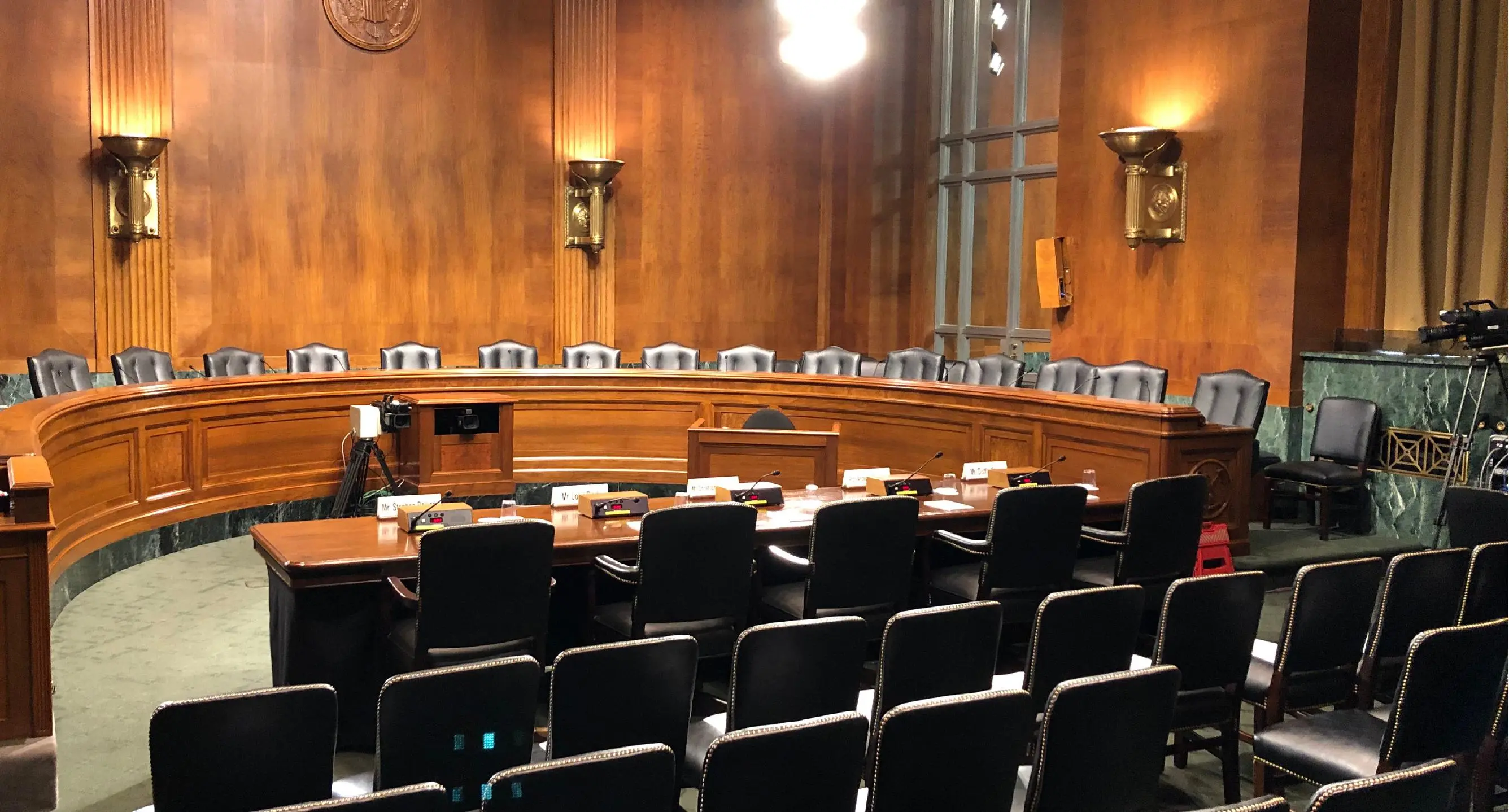Join the Movement - Sign the Delay Manifesto 📑


My Statement to the Senate Judiciary Committee - “Protecting Innocence in a Digital World”
On Tuesday, July 9, 2019, Chris McKenna, the founder and CEO of Protect Young Eyes, was invited as one of five witnesses to a Senate Judiciary Hearing titled, “Protecting Innocence in a Digital World.” This work is an extension of the #FixAppRatings Campaign that started in January.The entire hearing is included below, which lasts around 1:45. At a minimum, we want all parents to read Chris’ 6-minute opening statement, which is a summary of over four years of work protecting childhood innocence. The text of his opening statement is below, or you can watch it starting at the 16:47 mark in the C-SPAN video below:
Senate Committee on the Judiciary: “Protecting Innocence in a Digital World”
Testimony of Christopher (Chris) McKenna, Founder and CEO, Protect Young Eyes
July 9, 2019
Chairman Graham, Senator Blumenthal, and members of the Committee, thank you for allowing all of us to speak today. I cannot think of a more noble cause for all of us to be spending our time on today than the safety and protection of our children.
I began Protect Young Eyes five years ago because the internet is complex and even diligent parents are overwhelmed by the digital choices their children are facing. Through thousands of hours of research, hundreds of presentations at schools around the country, and dozens of articles examining digital trends, we have witnessed both the wonderful potential and the troubling and pervasive darkness that exists in the pockets of millions of young people today.
I’m certain that in the course of today’s discussion, we will hear difficult stories. I wish they were uncommon.
In March 2019, CNN reported that Instagram was the leading social media platform for child grooming by sexual predators1. Our own test accounts quickly discovered that young people, particularly young girls, can be hunted like prey. We started an Instagram account with two photos and tried to mimic the behavior of an average teen girl. We posted two selfies with three hashtags each, searched a few hashtags, and liked a few photos. Within a week we had dozens of men sending us images of their genitals, telling us they were horny, and sending us hardcore pornography through direct messages. Even after we told all of them that we were “only 12.” They were relentless.
A recent poll of 2,000 teens found that nearly 75% of them had received pornographic direct messages from strangers,2 even if they had a private account.
But you won’t find any warnings in the app store descriptions for Instagram that mention anything about sexual predators, direct message risks, sex trafficking, or hardcore pornography. Instagram’s defaults are not set for child safety or data privacy even though Instagram is rated 12+ by Apple and 13+ by Google.
At Protect Young Eyes, we’ve also seen first-hand the predatory, symbiotic relationship that exists between Instagram and Snapchat, both used by 75% of all teens3. Many Instagram predators quickly shuttle kids over to Snapchat where evidence disappears. For example, one relentless pedophile on Instagram, who calls himself, “Daddy,” invites young girls to join him in Snapchat with Instagram posts like “12+ year-old slave girls”, “Obedient whores only”, or “Hit me up on Snap to be daddy’s naughty girl.”
Snapchat is where explicit content on Pornhub lives just seconds away from every user through backdoors within the app. The app knowingly allows a well-documented list of porn performers to make thousands of dollars daily through their premium Snap accounts4.
Snapchat is where harmless looking face filters can encourage kids to share their location on Snap Map. It’s the app that gave a Coors beer ad to a 13-year-old, even though they tout “age-gating.” 5 It’s the app where every kid, regardless of age, has access to the Discover news section where they are taught how to engage in risky sexual behaviors such as hookup, group, anal, or torture sex, how to sell drugs, and how to hide internet activity from parents using incognito mode.
But again, you won’t find anything in Snapchat’s app store descriptions that warn parents about premium Snapchat accounts, predator risks of using Snap Maps, or the hyper-sexualized content in Discover news. Snapchat is rated 12+ by Apple and 13+ by Google.
for inaccurate ratings. For example, Twitter was rated 4+ for a decade even with hardcore porn and prostitution everywhere. It is still breaking Apple and Google’s no porn policy but only claims “infrequent/mild sexual content” in the app description. Netflix is rated 4+ in Apple’s App Store and Teen in Google Play. VPNs, which allow teens to circumvent parental controls, are rated 4+. Most social media platforms are rated 12+ by Apple, even though COPPA restricts the use by children until age 13. Obviously, the current app ratings process is broken.
Tech companies will tell us that protecting kids is a parent’s responsibility. However, this position ignores the ubiquitous nature of the internet. Even if I do everything right to protect my daughter, with almost 90% of teens owning a smart device6, a simple ride on the bus or a visit to a friend’s house can expose her to life-altering content. Never before in human history have young people had the ability to so radically change the trajectory of each other’s lives so quickly.
Tech companies will tell us that safeguards are already in place, but it currently takes over 30 steps to properly set up parental controls on an iPhone! We need to simplify this process to help more parents protect their children. For example, better age-based defaults would instantly and easily protect millions of kids. The addition of easy controls over school and bedtime could shut off distracting apps during these critical times.Tech companies will tell us that regulating apps is too big of a job. It can’t be done. However, video games are already successfully doing it and the ESRB shows us a path that could be applied by reasonable individuals to apps. In fact, it was Mark Zuckerberg of Facebook who said, “I believe we need a more active role for governments and regulators.”7 We agree.
We need to simplify this process to help more parents protect their children. For example, better age-based defaults would instantly and easily protect millions of kids. The addition of easy controls over school and bedtime could shut off distracting apps during these critical times.Tech companies will tell us that regulating apps is too big of a job. It can’t be done. However, video games are already successfully doing it and the ESRB shows us a path that could be applied by reasonable individuals to apps. In fact, it was Mark Zuckerberg of Facebook who said, “I believe we need a more active role for governments and regulators.”7 We agree.
Our hope is to create safer digital places for young people. Two simple solutions could change everything8: 1) Create a uniform, independent, and accountable rating system and 2) Enact better defaults based on the age provided during device and app setup. Let’s fix this #forthekids. Thank you and I look forward to your questions.
https://www.c-span.org/video/standalone/?462403-1/childrens-online-privacy
News articles about the hearing:
- Senate Judiciary Committee – Protecting Innocence in a Digital World
- Bloomberg – Time to Reign in Section 230 Immunity
- POLITICO – Snapchat in the Spotlight
- Breitbart – Amend Section 230 to Combat Sex Trafficking
- Los Angeles Times – IBM Proposes Changes to Section 230 Immunity
- UK Telegraph – Big Tech Faces Grilling over Child Exploitation
- Deseret News and KSL News – Mike Lee says Social Media is like strip clubs
- Charlotte Observer and McClatchy DC Observer – Facebook and YouTube Doing Enough to Protect Kids?
- Rollcall – Tech Companies Should Earn Liability Shield
- Value Walk – Hold Tech Companies Accountable
- KSL News – App Ratings Heading to the Senate
- Breitbart – Senator Blackburn wants Social Media Accountability
- Franklin News – We Need an App Ratings System
- WTOP News – Snapchat and Instagram Must to More to Protect Children
- Independent Herald – Lawmakers Call on Big Tech to Protect Kids
- Breitbart – Senator Blackburn Says Snapchat a Predator’s Dream
- Times Free Press – Senator Blackburn Blasts Snapchat
- NCOSE Press Statement – Senate Hearing Uncovers Sexploitation in Apps
Social media activity after the hearing:
Chairman Lindsey Graham:
- [KEY POST] Very beneficial hearing today in @senjudiciary regarding dangers children face from internet predators on social media. ICYMI: (link to hearing video)
- [KEY POST] I believe when it comes to protecting children from sexual exploitation, social media companies should be required to meet ‘Best Business Practices’ to earn their liability protection in this area.
- Tweet #3
- Tweet #4
- Tweet #5
Senator Josh Hawley:
Senator Mike Lee:
Senator Ted Cruz:
Senator Marsha Blackburn:
Senator John Kennedy:
- Facebook post
- YouTube video

End notes for the opening statement:
- Picheta, Rob. (March 1, 2019). “Instagram is leading social media site for child grooming” [Blog post]. Retrieved March 5, 2019 from: https://www.cnn.com.
- This poll was performed by Collin Kartchner on his personal Instagram account. We miss and remember Collin for his all diligent work and efforts.
- The Associated Press. “Instagram and Snapchat are the most popular social media networks for teens” [Survey]. Retrieved April 14, 2019 from http://www.apnorc.org/projects.
- McKenna, Chris. (June 30, 2019). “Warning: Pornhub is on Snapchat. And parents have no idea” [Blog post]. Retrieved June 30, 2019 from https://protectyoungeyes.com.
- McKenna, Chris. (June 7, 2019). “A complete guide to Snapchat filters” [Blog post]. Retrieved June 30, 2019 from https://protectyoungeyes.com.
- Bauer, Ted. (October 5, 2018). “89% of teens own smartphones–what does that mean for marketers?” [Blog post]. Retrieved April 13, 2019 from: http://www.info.analytics.com.
- Zuckerberg, Mark. (March 30, 2019). “Mark Zuckerberg: The internet needs new rules. Let’s start in these four areas” [Article]. Retrieved July 5, 2019 from: https://www.washingtonpost.com.
- Please visit https://fixappratings.com for more details about our complete Fix App Ratings campaign, including additional evidence, news, and allies that support our movement.
What if I have more questions? How can I stay up to date?
Two actions you can take!
- Subscribe to our tech trends newsletter, the PYE Download. About every 3 weeks, we’ll share what’s new, what the PYE team is up to, and a message from Chris.
- Ask your questions in our private parent community called The Table! It’s not another Facebook group. No ads, no algorithms, no asterisks. Just honest, critical conversations and deep learning! For parents who want to “go slow” together. Become a member today!

A letter from our CEO
Read about our team’s commitment to provide everyone on our global platform with the technology that can help them move ahead.
Featured in Childhood 2.0
Honored to join Bark and other amazing advocates in this film.
World Economic Forum Presenter
Joined a coalition of global experts to present on social media's harms.
Testified before Congress
We shared our research and experience with the US Senate Judiciary Committee.


















